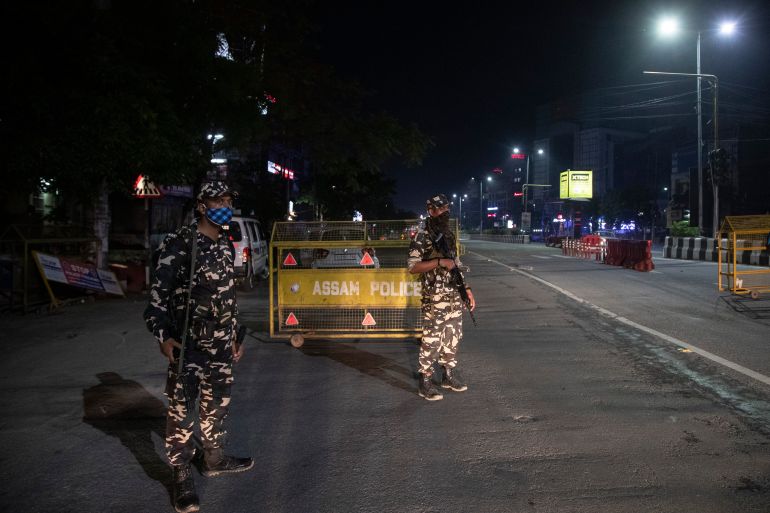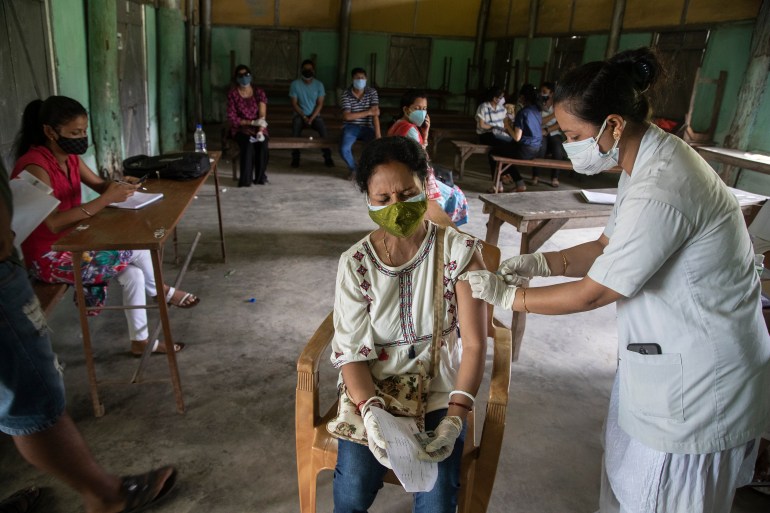Now, fears of a COVID surge in India’s northeast
University of Michigan model, which predicts spread of cases before they are detected, says infections in Assam occurring as fast as any other place in India.

With experts saying the coronavirus is likely spreading in India’s northeastern state of Assam faster than anywhere else in the country, authorities are preparing for a surge in infections by converting a massive stadium and a university into hospitals.
Cases in Assam started ticking upward a month ago and the official seven-day average of daily cases in the state on May 9 stood at more than 4,700 cases.
Keep reading
list of 4 itemsIndia COVID-19 deaths could touch 1 million by August: Lancet
Third COVID wave in India ‘inevitable’, warns top gov’t scientist
‘I can’t forget the desperate sound of people trying to breathe’
But a model run by the University of Michigan – which predicts the current spread of cases before they are actually detected – says infections in Assam are likely occurring as fast as any other place in the country.
Add to that recent elections in the state – and the huge political rallies that accompanied them – and experts fear an uncontrolled surge is on the horizon.
Worryingly, along with cities on India’s northeastern frontier – which is closer to Myanmar, Bangladesh and Bhutan than it is New Delhi – cases have also started to spike in some remote Himalayan villages.
Nationwide, India’s health ministry reported 360,000 new cases in the past 24 hours on Monday, with more than 3,700 deaths.
Since the pandemic began, India has recorded more than 22.6 million infections and more than 246,000 deaths – both, experts say, almost certainly undercounts.
Officials in Assam were racing to prepare for a virus surge because similar onslaughts have overwhelmed hospitals in much richer Indian states.
“We are adding 1,000 beds a week to prepare ourselves in the event of cases spiralling,” said Dr Lakshmanan S, director of the National Health Mission in Assam.
The state’s largest government-run hospital, the Guwahati Medical College Hospital, has more than doubled its number of intensive care beds to 220 and health officials are building space for another 200 in the hospital’s parking lot.

A football and cricket stadium is being converted into a 430-bed COVID hospital. The private Royal Global University in the main city of Guwahati has been converted into a 1,000-bed hospital.
The state is sending doctors, paramedics and medicine to these facilities and the university said it would provide books and newspapers for patients to read.
“This is the least we thought we could do in this time of huge crisis for our country,” said Dr AK Pansari, the university chairman.
There are 2,100 beds reserved in government centres for COVID-19 patients in Guwahati, with hundreds more planned. This is in addition to the existing 750 beds for patients at private hospitals in the state.
Even as infections increased, vaccination rates have fallen in Assam and other states in the region since India expanded its coverage to include all adults on May 1.
Adding to concerns is the confirmation that the virus has started spreading into more remote Himalayan villages with poor health infrastructure. These areas are home to Indigenous tribes, who already face some of the lowest access to healthcare in the nation.
The region had been largely untouched by the virus but it now appears the virus was spreading in remote villages without people knowing until it was too late.
The lack of awareness, resources and the remoteness of these villages is complicating contact tracing in such areas, said Dr Mite Linggi, the medical superintendent at the district hospital at Roing in Arunachal Pradesh state.
Despite the limited medical infrastructure and even more limited medical supplies, Linggi said what they really feared were power cuts.
“Power is crucial for running oxygen supply. We have patients gasping for air when the power comes and goes out,” he said.